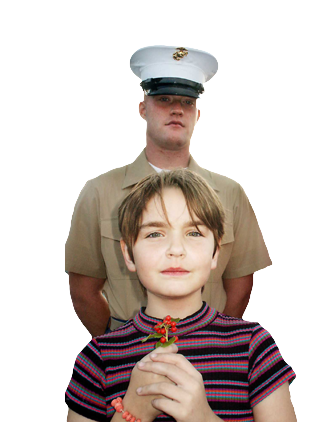[caption id="attachment_3395" align="alignleft" width="286"] Marine Corps Pvt. Bernard D. Lueken, Platoon 3246, Company L, eats an apple after tackling an obstacle course during boot camp training at Edson Range, Marine Corps Base Camp Pendleton, Calif., Sept. 14, 2010. Lueken played college football for two years before he joined the Marine Corps. U.S. Marine Corps photo by Cpl. Rebecca A. Lamont[/caption] MARINE CORPS RECRUIT DEPOT SAN DIEGO – Marine Corps Pvt. Bernard D. Lueken said his departed mother’s military service and his inner voice caused him to give up a promising football career and enlist in the Marine Corps.
Marine Corps Pvt. Bernard D. Lueken, Platoon 3246, Company L, eats an apple after tackling an obstacle course during boot camp training at Edson Range, Marine Corps Base Camp Pendleton, Calif., Sept. 14, 2010. Lueken played college football for two years before he joined the Marine Corps. U.S. Marine Corps photo by Cpl. Rebecca A. Lamont[/caption] MARINE CORPS RECRUIT DEPOT SAN DIEGO – Marine Corps Pvt. Bernard D. Lueken said his departed mother’s military service and his inner voice caused him to give up a promising football career and enlist in the Marine Corps.
 Marine Corps Pvt. Bernard D. Lueken, Platoon 3246, Company L, eats an apple after tackling an obstacle course during boot camp training at Edson Range, Marine Corps Base Camp Pendleton, Calif., Sept. 14, 2010. Lueken played college football for two years before he joined the Marine Corps. U.S. Marine Corps photo by Cpl. Rebecca A. Lamont[/caption] MARINE CORPS RECRUIT DEPOT SAN DIEGO – Marine Corps Pvt. Bernard D. Lueken said his departed mother’s military service and his inner voice caused him to give up a promising football career and enlist in the Marine Corps.
Marine Corps Pvt. Bernard D. Lueken, Platoon 3246, Company L, eats an apple after tackling an obstacle course during boot camp training at Edson Range, Marine Corps Base Camp Pendleton, Calif., Sept. 14, 2010. Lueken played college football for two years before he joined the Marine Corps. U.S. Marine Corps photo by Cpl. Rebecca A. Lamont[/caption] MARINE CORPS RECRUIT DEPOT SAN DIEGO – Marine Corps Pvt. Bernard D. Lueken said his departed mother’s military service and his inner voice caused him to give up a promising football career and enlist in the Marine Corps.Lueken, 21, graduated from boot camp here, along with 482 other newly minted Marines, on Sept. 23. The St. Louis, Miss., native previously played football for four years as an offensive tackle at Chaminade College Preparatory School in Creve Coeur, Miss.“I tried out for the [Chaminade] football team as a freshman and was advised by the coach to pursue an athletic career in football,â€Â said Lueken, who later was awarded a full athletic scholarship to attend the University of Kansas in Lawrence, Kan. Lueken said he owes much to the strong character of his mother, who died of breast cancer seven years ago. She was one of the first women Marines to graduate from boot camp after it was designed to replicate men’s training, he said. She served six years in the Marines. “She would tell me, ‘Once a Marine, always a Marine,’â€Â Lueken recalled. “She taught me principles, traits and aspects of the Marine Corps like dedication, loyalty and to be good to the people around me.â€Â After his mother died, Lueken channeled his emotions and energy into sports. Lueken said he was “physically and mentally readyâ€Â to play college football at the University of Kansas, noting he played for the Jayhawks for nearly two years. The intensity and dedication required to play college football, he said, is similar to the intensity and dedication required for the Marine Corps. “There were many days we got up at 4 a.m. and would physically train, have film sessions where we studied the opponent, and position meetings, which are like small-unit meetings similar to having fire teams,â€Â Lueken said. “We would also take college classes, [and] have tutors for classes, which were required because we often wouldn’t be finished until 10 p.m.â€Â Despite his athletic accomplishments, Lueken said he eventually realized he didn’t want to be a football player. “I was playing at the highest level and I felt like I was wasting my time,â€Â Lueken said. “My years of youth could be spent for a better cause. I figured you only have your body and health once; I wanted to put it to good use.â€Â Lueken said he couldn’t ignore the fact that he was just playing a game. “The Marine Corps is not a game. It deals with real issues,â€Â he said. “College football is pure entertainment. It’s what people watch to get their minds off real-world issues.â€Â “Lueken understands the [Marine Corps] core values because he has known them all his life,â€Â said Staff Sgt. Levi K. Fajardo, senior drill instructor, Platoon 3246, Company L. “He had them in him when he got here. He came with a good foundation and he was well prepared.â€Â “What’s so appealing about the Marine Corps is that it’s a group of people that can get together and strive for a better cause,â€Â Lueken said. “I am a big believer in the ripple effect — you do something and it carries to another person.â€Â Lueken said he made the right choice by joining the Marines and doesn’t regret leaving football. “I don’t want to wake up one day and look back and say, ‘I wish I would have,’â€Â he said. Football “was exciting and fun, but we weren’t helping anyone.â€Â Sept. 28, 2010: By Marine Corps Cpl. Rebecca A. Lamont- Marine Corps Recruit Depot San Diego






